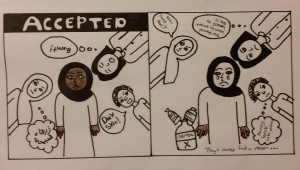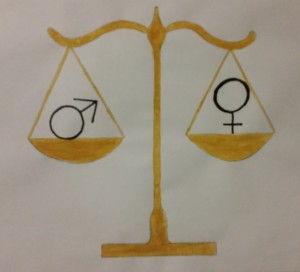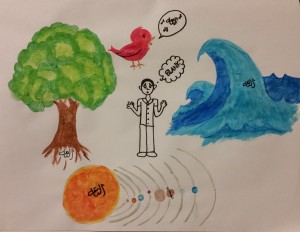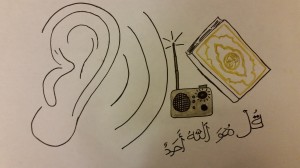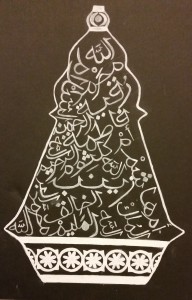Introduction
ø
“لااله الا الله” – There is no god but Allah. The core of the declaration of faith that is required of every Muslim and the first pillar of Islam. I do not recall when I was first taught these words. For as long as I can remember, I have had this phrase repeated to me over and over again. “There is no god but Allah.” It was screamed at times of turmoil. “لااله الا الله” It was whispered in the presence of wonder.
Many of my blog posts are influenced by my background; my culture, where I grew up and how I first formed my views on religion in general and Islam in specific.
My Background:
I am a Muslim woman. I grew up in the city of Khartoum in Sudan, a country in Africa that identifies as an Islamic country, whose laws are supposedly based on Shari’a laws. Growing up in Khartoum, religion, Islam to be more specific, was intertwined with the Sudanese culture. I always found it hard to determine which parts of our culture were influenced by religion and which parts weren’t. To me, culture and religion were two parts of the same whole. Even looking back at the history of Islam, the religion was introduced to mankind within the context of a culture. It does not exist in pure form and cannot exist without a culture to support it. And that is in part what we learnt during the course. Islam is often associated with the Arab world. The Qur’an itself is written mainly in Arabic. However, throughout the course of this seminar we were exposed through literature to different Islamic cultures from different parts of the world, from Africa to Asia. Seeing the way Islam fit in with the cultures and was incorporated within these cultures was extremely eye opening. It was like seeing a new and unique version of Islam with every culture we visited. The idea of religion being a part of culture is represented in my blog.
Growing up in Sudan, I was exposed on a daily basis to the idea of colonization. Sudan was imperially colonized and only gained it’s independence on the 1st of January, 1956. As is the case with other colonized countries, Sudan experience major repercussions from this colonization, the most significant of which being the division of South Sudan. One of the tactics used by the British was “Divide and Conquer” and they used this strategy on Sudan. While the North was developed, bridges and ports built to serve imperial purposes and Islam maintained, the South remained underdeveloped and christianity was spread through missionaries. And this is where it all started. After independence, the new rulers promised to develop the south but failed to keep their promises and as a result, a civil war erupted and eventually the South split as it’s own country. This has had a profound impact on how I view foreign intervention with a country’s sovereignty and this was very much part of some of the readings we did throughout the course and so, became a part of this blog.
Other consequences of colonisation is that it affected the way we view the world. Our beauty standards have changed to match those of the west. I used to wonder how a country in Africa, a continent that is home to so many black people, a country whose name literally translates to land of the blacks, would place such high value on the lighter skin tone. Later on in life I got to understand that beauty in particular is influenced by many factors and in Sudan, one of them was colonialism. This in turn helped me understand the phenomena that is skin bleaching which is so prevalent in Sudan.
After independence, control over Sudan fell in the hands of many leaders until it got to Omar Al Bashir, our current president. Under his rule, Islamic codes were enforced. As I grew up, I always thought the Islam I learnt in school (part of the national education requirements) was the true Islam. Little did I know that the views reflected in the books they used to teach us about Islam at school were skewed. They were tailored and manipulated to fit the government’s political purposes. As years went by, and my eyes started opening up to the world, I learnt that our government was actually corrupt and has been using Islam as one of it’s tool to control the public. The “rules” of Islam that I was taught at school were actually too strict and narrow-minded. Thankfully, my parents corrected this view I had of Islam and I was taught a new, more relaxed set of rules. The government on the other hand, continued to justify horrible actions and crimes that it committed through the name Islam. They managed to convince parents’ who’s young kids they have taken to a pointless war that their children will die as martyrs. With the majority of the population being illiterate, the government had the perfect set up. They used the power of reading and writing they had to teach these people false meanings of the multifaceted religion they followed, conditioning them to a single interpretation and never giving them the chance to apply their religion to their unique lives. And this was one of the biggest aspects of Islam that was uncovered to me throughout the course: it is dynamic. Even after my parents corrected my views on Islam, I still had the idea that it a set of strict rules. Yet, the first thing we learned in this course is that Islam is not static but changes with time, culture etc. It’s experience is unique to every person. The solid interpretations of the verses of the Qur’an dissolved before my eyes as I learned how illogical that notion is: to have someone tell you what a verse that was sent down as guidance to you seems absurd.
This brings me to my next point. Part of my journey in Sudan involved experiencing what it is like to be a woman in a country that oppresses women. Not only do the Sudanese laws oppress women, they make them believe that this oppression is part of their beloved religion. I always thought that forcing women to wear the hijab was part of Islam. Having men beat their wives was also part of the islam I was taught. Of course both ideas seemed ridiculous to me but I never really questioned them because I was supposed to obey these religious laws without asking any questions. What this course revealed to me in terms of interpretation is that religion is just one more way for men who do not want gender equality to control women. How can we expect men who the Qur’an verse on hijab wasn’t meant for to interpret the verse correctly? Much like other atrocities committed under the name of Islam, oppression of women is another one of them. As a woman, I also got to witness other women or young girls being forced into marriage. I always thought it was an odd tradition. Naturally, Islam made it’s way to this tradition and I often heard people claim that any other way to marriage is sinful from the point of view of Islam. This was an interesting concept to me and that is why I try to understand it through one of my blog posts.
Other aspects of Islam that were revealed to my by the course:
One of the readings we did in the course revolved around a traditional village in Egypt. With Sudan and Egypt being neighbors and sharing the same culture for a significant part of history, much of the topics covered in the novel applied to Sudan the same way it did to Egypt. One of the topics that caught my attention was the use of traditional and religious means to cure diseases. Now in Sudan, the first thought that comes to mind when someone gets ill is taking them to see a Sheikh. Sheikh’s are usually older men who have studied (either formally or informally) religion and have devoted their lives to Islam. If the Sheikh’s “religious magic” doesn’t work then it’s herbs and visits to other religious men and women who cook up concoctions that are supposedly blessed and can cure any disease. Any form of modern medication is sometimes rejected by people, particularly those who live in rural Sudan. Which brings me to my next post.
Something I always knew in the back of my mind was the depiction of islam in terms of science. I always had an idea of where it stands when compared to science but it was never really an active thought in my head. However, as this course progressed, we started discussing this idea of science and religion. Often times, the reason people who are maybe more traditional in their thinking reject modern medicine or science is that they view it as straying away from Islam. Indeed, in many cases, science is viewed as a product of the west and the western world is considered the enemy of Islam. In many ways, the western culture is believed to be the polar opposite of islamic cultures and teachings and so avoidance of anything to do with this wicked west is encouraged. Our Sudanese president never fails to blame most things that are going wrong with Sudan on the sinful west which in turn pushes people further away from anything western. Ignorance lies at the heart of this issue. Ignorance of the people who think “America” and “modern” are synonymous and people who believe “muslim” and “terrorist” are synonymous. That is why in our day and age, religious literacy is important. To avoid such misconceptions.
Reflection:
Looking back at the course, I can confidently say that my views on Islam have shifted dramatically. I am no longer the same Muslim I was at the start of the course. The way I view the world itself has changed. I used to think it was difficult to reconcile my feminist side with my muslim side. I have been taught all of my life that this religion marginalizes women and how silly would it be for me to try to make two opposites coexist. After learning more about women in Islam, I can now use my religion to support my views on gender equality.
This blog is collection of thoughts the readings evoked and the connections I was able to make with and draw from my own culture.
